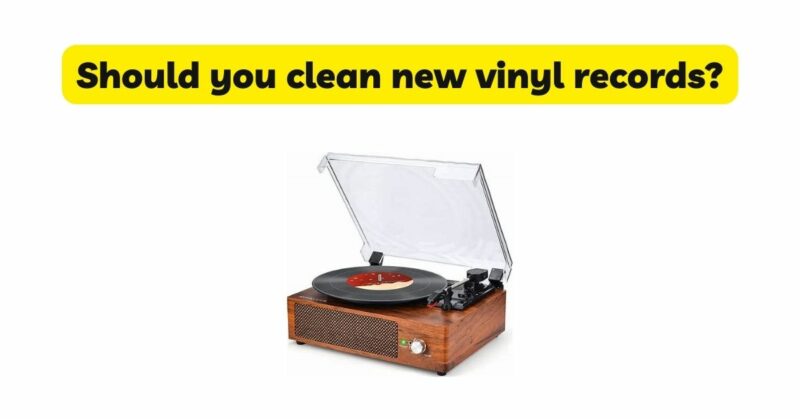Vinyl records have made a remarkable resurgence in recent years, attracting audiophiles and music enthusiasts alike with their warm, rich sound quality. As vinyl sales continue to climb, more and more people are diving into the world of vinyl collecting. Whether you’re a seasoned vinyl enthusiast or a newcomer to the format, one question that often arises is whether new vinyl records require cleaning before playing.This article will delve into the topic of cleaning new vinyl records, examining the reasons behind potential contamination, exploring the benefits of record maintenance, and providing practical guidelines for the care of your cherished vinyl collection.
Understanding the Manufacturing Process
To grasp the importance of cleaning new vinyl records, it’s crucial to comprehend the vinyl manufacturing process. Vinyl records are created by pressing a vinyl compound onto a metal stamper that contains the audio information. During this process, various contaminants can find their way into the vinyl, including dust, dirt, mold release agents, and static electricity. Additionally, the records often come housed in protective sleeves, which may not be completely dust-free, leading to further contamination.
Potential Issues with New Vinyl Records
- Surface Noise and Pops: The presence of contaminants on the record’s surface can result in surface noise and pops, affecting the listening experience and reducing sound quality.
- Groove Damage: Playing a dirty record can lead to premature wear and tear on the grooves, potentially reducing the record’s lifespan and causing permanent damage to the audio fidelity.
- Needle and Cartridge Damage: Dust and debris can accumulate on the needle and cartridge during playback, leading to misalignment and potential damage to these delicate components.
- Long-term Storage: If new vinyl records are not cleaned before storage, contaminants may continue to settle over time, making future cleaning more challenging and potentially causing irreversible damage.
The Benefits of Cleaning New Vinyl Records
- Improved Sound Quality: By cleaning new vinyl records, you remove unwanted debris from the grooves, leading to better sound quality, reduced surface noise, and a more enjoyable listening experience.
- Prolonged Lifespan: Regular cleaning helps extend the lifespan of your records by reducing wear on the grooves and preserving the audio fidelity for years to come.
- Enhanced Needle and Cartridge Life: Keeping your records clean ensures the needle and cartridge remain free from debris, minimizing wear and extending their operational life.
- Preventing Mold Growth: Vinyl records that are stored in humid or damp environments may develop mold over time. Regular cleaning can prevent mold growth and preserve the integrity of your collection.
Methods of Cleaning New Vinyl Records
There are various methods for cleaning new vinyl records, each with its pros and cons. Here are some popular techniques:
- Dry Brushing: A soft carbon fiber or anti-static brush is used to remove surface dust and debris gently. While this method is quick and straightforward, it may not eliminate deeply embedded contaminants.
- Wet Cleaning: Utilizing a vinyl record cleaning solution and a microfiber cloth or a record-cleaning machine, wet cleaning offers a more thorough approach to remove dirt and grime from the grooves. However, it requires more time and effort.
- Ultrasonic Cleaning: This advanced method involves using an ultrasonic record cleaner, which uses ultrasonic vibrations and a cleaning solution to deeply cleanse the grooves. Ultrasonic cleaning is highly effective but can be costly for home use.
Best Practices for Cleaning New Vinyl Records
- Inspect Your Records: Before cleaning, visually inspect the new vinyl records for any visible contaminants, such as dust, fingerprints, or manufacturing residues.
- Use a Carbon Fiber Brush: A dry brush is a gentle and quick way to remove surface dust before playing the record.
- Wet Cleaning Technique: For a more thorough cleaning, wet cleaning is recommended. Apply a record cleaning solution to a microfiber cloth and gently wipe the record in the direction of the grooves. Avoid excessive pressure to prevent damage.
- Record Cleaning Machines: Consider investing in a record cleaning machine if you have a substantial vinyl collection. These machines use various methods, including vacuum suction, to achieve deep cleaning.
Conclusion
While it may be tempting to assume that new vinyl records are ready to play straight out of the sleeve, the truth is that cleaning them before the first spin is essential for optimal sound quality and longevity. By understanding the potential issues with new vinyl records and the benefits of regular cleaning, you can preserve the integrity of your collection and enjoy the best possible listening experience.Remember, whether you choose a dry brushing method, wet cleaning with a solution and cloth, or invest in an ultrasonic cleaner or record cleaning machine, the key is to handle your vinyl records with care and maintain a regular cleaning routine. By doing so, you’ll ensure that your records provide you with countless hours of musical enjoyment for years to come.


